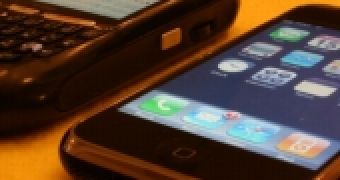Ever since the iPhone was unveiled, up when it finally launched, the device has been most often compared against Research In Motion's products. Such comparisons have long since stopped, but may start anew as RIM is said to be preparing new devices that sound remarkably similar to the iPhone.
The new '9000-series' that RIM has in the works is said to be intended to take on Apple, Google and others. Analysts describe it as being totally different from the company's current products, the future of the BlackBerry franchise and a complete breakaway that will target the consumer space. Described as targeting the consumer space, the device is expected to have a form factor similar to that of the iPhone, down to the touch screen interface. Like in the days of yore, the notion that the lack of a physical keyboard makes for poor typing and subsequent undesirability for business users is back in full force.
Although this might sound like a rerun of the iPod situation from a few years back when some company or another was preparing their latest device, which would take on the iPod by trying to copy the iPod, things might actually be different this time. Of all the current phone manufacturers, RIM has the best chance of actually delivering a decent competitor to the iPhone. Unlike Nokia, Motorola and all the other companies that actually make phones with other stuff such as cameras and music taped on, RIM has been offering devices that also have phone capabilities. While the company doesn't have much chance of beating Apple at their own game, they might actually come out with something that is a solid competitor and the customer will win. Besides preventing market stagnation, which has been a considerable problem in this area where phones have been doing pretty much the same thing for many years, such a device will further encourage a diverse marketplace. Between Apple's iPhone, Google's Android and RIM, it is next to impossible for the industry to ever reach the point the computer industry was in, back in the late 90s, where if you didn't have Microsoft your hands were tied.

 14 DAY TRIAL //
14 DAY TRIAL //